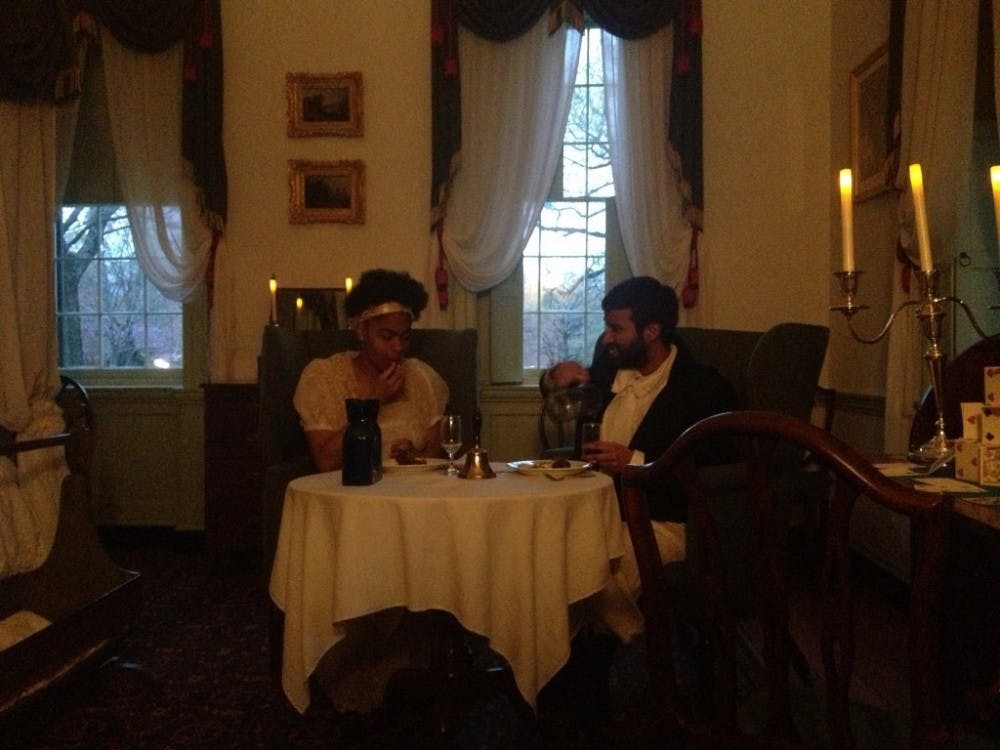Conversations With the Carrolls, a living history performance held this weekend at Homewood Museum, brought to life the people who both enjoyed and supported life in the Homewood house during the early 19th century. Conversations was produced by Helena Arose and Sarah Braver, directed by Saraniya Tharmarajah and featured a screenplay by Julia Phoon. Utkarsh Rajawat, Tatiana Ford, John Del Toro, Garlyn Colas and Saraniya Tharmarajah all acted in the show.
The production was sponsored through an Arts Innovation Grant from the Andrew W. Mellon Foundation. The show told the story of Charles Carroll of Homewood; his wife, Harriet Chew; and their slaves, head domestic William Ross, their gardener Izadod and the children’s nurse, Cecilia. The show traced Charles and Harriet’s life at Homewood from their arrival as happy newlyweds to their final, permanent marital separation.
Sarah Braver and Helena Arose, the two producers of Conversations, discussed the project in a series of Facebook messages.
Braver described the challenges of bringing a production like Conversations to life in a museum setting.
“We think our biggest challenge was trying to convey historical information in a way that would be interesting,” Braver wrote. “We were very happy with how well we succeeded in accomplishing our goal of bringing students into the museum. We were most surprised with how big of an endeavor this was — no matter how organized we were, anything can happen that you aren’t prepared to deal with.”
Helena Arose described how the pair developed the idea for this living history production during a class last year.
“We were inspired to create this after a class assignment in Introduction to the Museums II where we had to come up with an idea to engage students in the museum,” Arose wrote. “Conversations with the Carrolls is a more developed version of Sarah’s idea for that assignment.”
Braver described all of the partnerships and mentoring that went into bringing Conversations to life.
“We received 3,000 dollars from an Arts Innovation Grant funded by the Mellon foundation, and our advisor was Dr. Jennifer Kingsley who really helped and supported us. We of course consulted with staff at the museum while we were doing research/reviewing the script,” she wrote. “We had a living history interpreter Dale Jones do a workshop with our actors about museum interpretation. We had a student scriptwriter and [five] student actors. Saraniya Tharmarajah was our student director and also played William. We basically just worked and partnered with a lot of amazing students.”
Arose described the satisfaction of having completed the project and the goals which the pair had regarding the future.
“It is great to finally see our abstract idea manifest in a concrete way, and it was better than we could have ever imagined it to be — it really helped us feel closer to Homewood and we hope it helped others feel the same. We were inspired to apply for another grant to do a different project senior year because of how much we enjoyed working on this one. It will definitely influence how we view museum interpretation in the future,” Arose wrote.
Tharmarajah discussed how she became a part of Conversations with the Carrolls and what the experience has meant to her.
“I remember Helena and Sarah first asked me to direct about a year ago at our A Place to Talk spring retreat. The experience itself was new and challenging. I’ve been doing theater for as long as I can remember, but this experience was unique in itself,” she wrote in an email to The News-Letter. “I was glad I got to use the skills I learned in my class Directing Seminar that I took for my theater minor last year. It was incredible to get to create art with some of my really good friends at Hopkins. I had always felt a strange guilt that I had never visited the Homewood Museum. But now, after spending many afternoons rehearsing in the museum itself, I feel as if I really understand and can appreciate the historical landmark on our campus.”
Tharmarajah found that the museum setting provided a perfect set for the play.
“The best aspect of having the play in the museum itself was that I didn’t have to worry about the set at all. When I first took a walkthrough of the museum, I knew I wanted to use the grand dining room, I just loved the attention to the intricacy to detail from the tassels on the curtains to the fake wax roasted chickens on the table.”
John Del Toro, one of the actors in the production, spoke with The News-Letter about his role in the production. Del Toro played the slave Izadod, who is whipped by Charles Carroll offstage. The whipping, a historical event that is known to have occurred at Homewood, is used in Conversations to illustrate the depth to which Charles Carroll had sunk, as alcohol and his increasingly strained relationships with his wife and father took their toll.
“We were all very interested in the fact you could clearly see there was a difference between Charles and Harriet and then Izadod and Cecelia, with the two ways that their two families are arranged, the fact that we seem to have a very happy marriage even though we were living as slaves, while Charles and Harriet were very much depressed,” Del Toro said. “We don’t exactly know why Izadod was beaten. And so we were believing that it was because of this dichotomy, this distance between the two, that I might have gotten beat. Because [Izadod] was always seen around with [his] wife, and seeing that happiness might have irritated [Caroll] more than he could handle anymore.”





